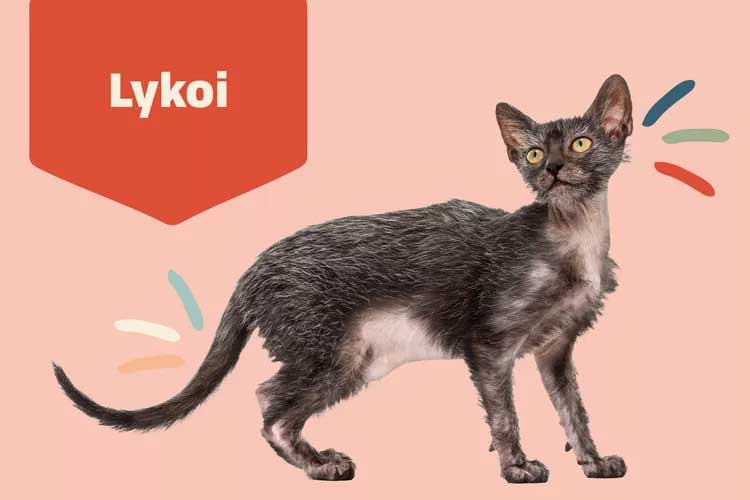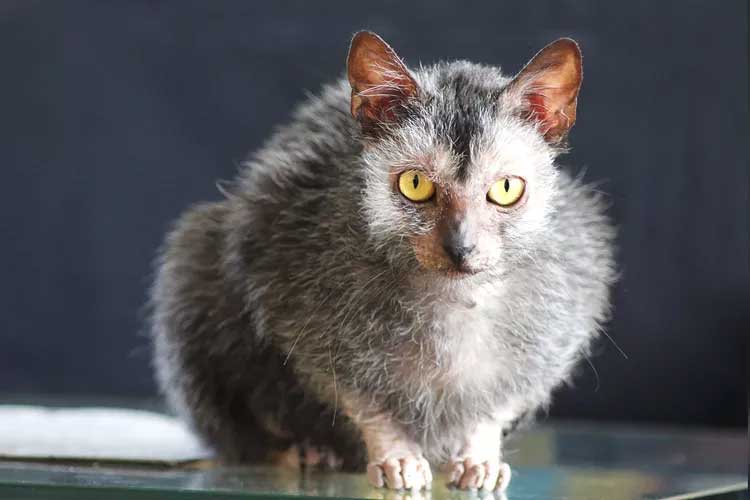With an undeniably odd werewolf-like appearance, Lykoi cats are warm, loving, amiable companions and devoted lap cats. Learn more about the Lykoi cat breed before you add one to the family.

Lykoi Overview
| OFFICIAL NAME | Lykoi |
| COMMON NAME | Lykoi |
| PET HEIGHT | 8 to 10 inches |
| PET WEIGHT | 6 to 12 pounds |
| LIFESPAN | 12 to 15 years |
| GOOD WITH | cats, children, dogs, families, seniors |
| TEMPERAMENT | affectionate, sociable |
| INTELLIGENCE | medium |
| SHEDDING AMOUNT | frequent |
| PLAYFULNESS | medium |
| ENERGY LEVEL | active |
| VOCAL LEVEL | when necessary |
| COAT LENGTH | hairless, short |
| COLORS | black / ebony |
| PATTERNS | color point, solid |
| OTHER TRAITS | easy to groom, friendly toward humans, friendly toward other pets, requires lots of grooming |
Throughout history, mankind has clamored for a cat that looked like Lon Chaney. And the Lykoi cat breed is here to answer that need.
Also sometimes called a "wolf cat" or "werewolf cat," the Lykoi is certainly one of the most visually unique cat breeds in the world. Despite their feral appearance, they are friendly, affectionate, playful cats who get along with humans and other animals.
Appearance
There's no way around it: The Lykoi might be a … challenging cat to love. This werewolf-like cat is generally medium-sized with a slender, toned body and wedge-shaped head that features a hairless "mask" of skin around its eyes, nose, muzzle and backs of the ears. Some Lykois are even completely hairless. This often gets them confused with sphynx cats, though the two share no genetic connection.
What coat the Lykoi does have is fine, short, and relatively soft despite having a coarse appearance. Black roan Lykoi cats are the standard color, with a slightly silvery appearance. The Lykoi has no undercoat, leaving him with just the thin top hairs, which can make them look almost mangy—like a werewolf. Their eyes are nearly round and amber or green in color.
Despite their fine, relatively short coats, Lykoi are not considered a hypoallergenic cat breed. Lykoi are heavy shedders, sometimes even more than a typical domestic shorthair, and Lykoi kittens are even born with a full coat.
"The breed developed from natural-occurring mutations that sometimes appear in domestic cats," says Marilyn Krieger, certified cat behavior consultant in San Francisco. "Kittens are born with hair and start losing it around one or two weeks of age. [They] can become completely bald, then their fur starts growing back."
Before bringing home a Lykoi kitten, spend time with the breed to see how your allergies react.
Temperament
This breed is an affable, easygoing cat. The Lykoi cat's personality allows him to get along well with humans, cats, and cat-friendly dogs with equal ease. Lykoi cat behavior is generally pretty playful, but they also wander off on their own for periods of time.
"Lykois are affectionate, sweet cats and are also very playful and full of energy," Krieger says.
They're open to strangers, but may remain somewhat aloof and shy around them at first, as they prefer the company of their regular human companions and may stick to them when company is over.
Living Needs
Because of that thin coat, the Cat Fanciers' Association recommends keeping Lykois as exclusively indoor cats. Their hair provides little protection from cold or direct sunlight, so keeping them well clear of both will go a long way towards keeping your Lykoi healthy and happy. In the winter, you might need to give your Lykoi a heated cat bed or a few sweaters to keep him comfortable, especially if he likes lounging near drafty windows to chatter at birds.Beyond those main concerns, the breed is pretty adaptable. They don't climb or hide any more than a typical breed, so a multi-level cat tree, a few scratching posts, and a couple of toys should suit them perfectly well. Multi-pet homes are rarely a problem for Lykoi kittens, especially if they've been properly introduced and socialized when they're young.
Care
Do you enjoy brushing cats? Because you're going to have to brush this cat. They are fairly regular shedders and, a couple times a year, Lykois can shed their entire coat before growing it back for the next season. Brushing once or twice a week will keep you ahead of most of the regular shedding, but the cats will also need bathing once a month or so to keep their exposed skin clean and free of oil buildup.
"Because they can accumulate a little oil around their ears and nails, ears should be cleaned and claws wiped with a soft cloth," Krieger says.
Though their grooming routine looks a little different from other cat breeds, Lykois still need typical housecat care, too. This includes keeping their nails trimmed, their food and water bowls replenished, and their litter box clean.
Because Lykois are intelligent and playful cats, they need lots of attention and playtime with their humans to be mentally stimulated and happy. "Lykois are highly active cats," Krieger says. "They love to play, some will retrieve, and they love to interact with their people."
Health
The Lykoi is such a new breed, it's really still too early to have a good grasp on their genetic makeup and potential issues. Getting yours checked for all of your standard cat issues, including Feline Infectious Peritonitis (FIP) and heart issues is your best bet.
"The most common thing we see in cats as far as disease is kidney disease. That's really just across the board in cats," explains Michelle Beck, DVM, CCRT, CVA, of the Backlund Animal Clinic in Omaha, Neb. "[And] cats, by the age of 10, [about] 70 percent of them have arthritis somewhere in their body."
Engage in a healthy dialog with your veterinarian about how your Lykoi is aging and keep an eye out for any potential issues at home.
"Hyperthyroidism is common as well," adds Lin Kauffman, DVM, of the Prairie View Animal Hospital in Grimes, Iowa. Owners can treat that disease, which spawns from an enlarged thyroid, through radiation treatment and foods low in iodine, she says.
History
The mutation that gives the Lykoi his distinct coat and appearance has been a randomly occurring phenomena in feral cats for years. In 2011, breeders Patti Thomas and Johnny Gobble founded the breed, producing the first litter of werewolf-kittens.
According to The International Cat Association (TICA), the breeders matched a pair of unrelated Lykois to prove the breed specifically came from the cats' genes. Some Lykoi cats are still born to feral cat colonies.
TICA granted the Lykoi registration status in 2012. As of 2017, TICA has approved the breed for championship status.
Fun Facts
All of the current domestic Lykoi in the world can trace their lineage back to feral cats.An extremely rare breed still, there are fewer than 100 show-standard Lykoi in the world.
The name Lykoi is a variation of the Greek word for wolf, lycos.